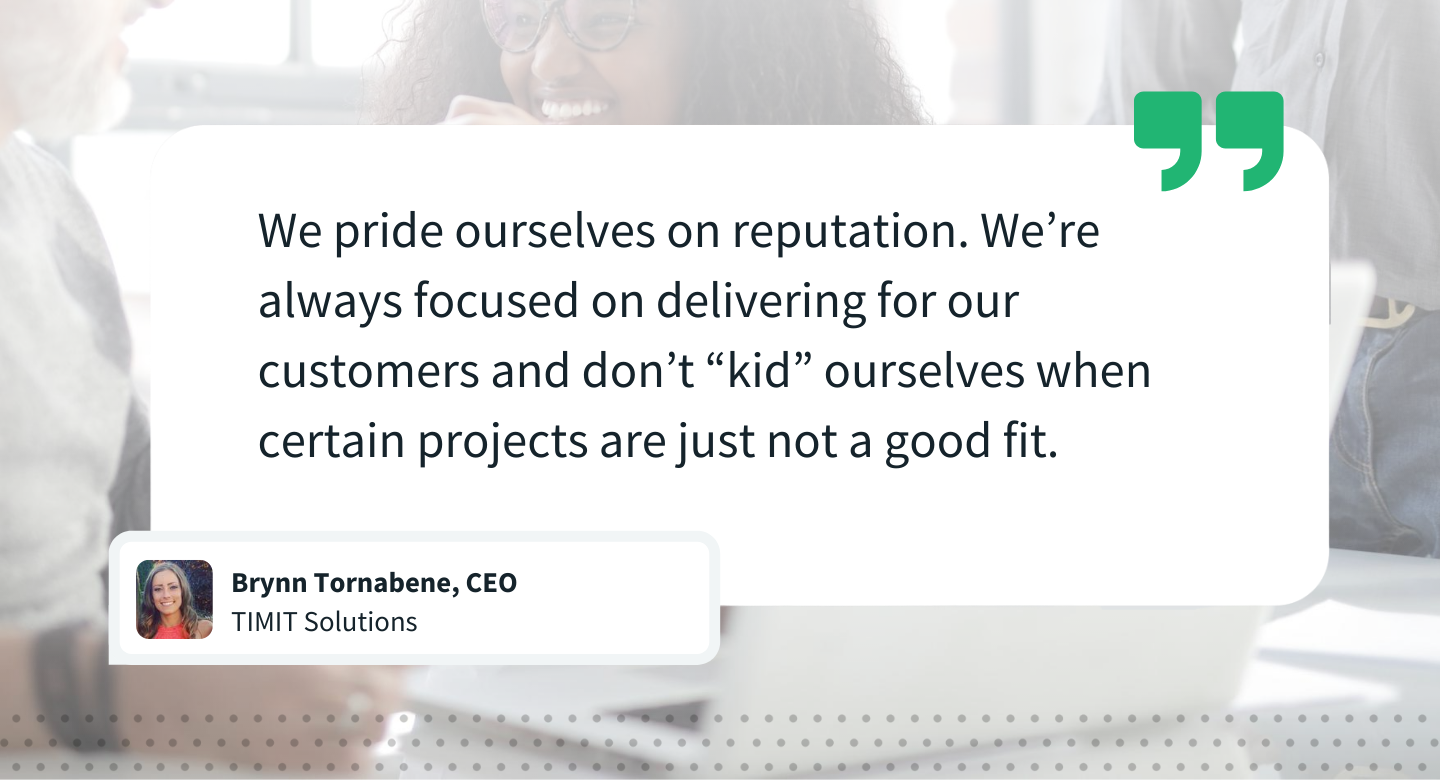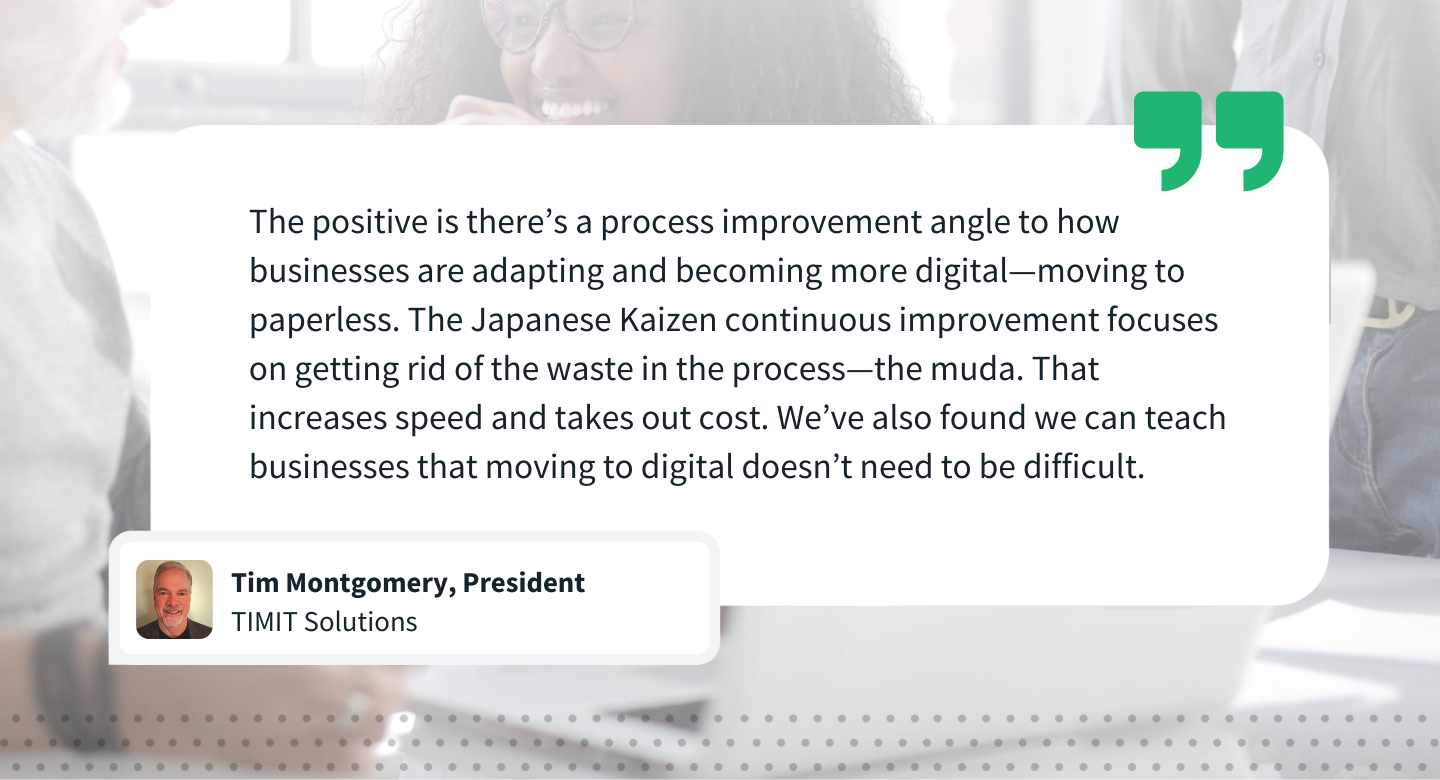Our VP of Partnerships Zak Pines recently interviewed Tim Montgomery and Brynn Tornabene, President and CEO of TIMIT Solutions, as part of our ongoing Partner Interview Series. Zak, Tim, and Brynn had a conversation about developing relationships with customers, helping businesses with COVID response, and partnering with Formstack. Here’s an abridged transcript of the chat.
TIMIT Solutions Background
Zak: Can you start by telling us about TIMIT?
Tim: We are a custom software developer based in upstate New York and Massachusetts. We create and maintain software solutions for our customers. As part of that, one of the main softwares we work with and resell is Creatio, and now also Formstack. We are a family, women-owned business.
Zak: Can you talk about how TIMIT came to be, and go back as far in the story as you’d like?
Tim: I had a corporate career for twenty years at General Electric. I overlapped Jack Welch’s era. I started within a month of when he started and left when he left. I didn’t get quite the same money and recognition. (Chuckles) It positioned me very well, and I’ve been able to take those learnings to help TIMIT customers with technology, accelerating change, working with cross-functional teams, and doing all that on a global basis.
From there, I worked for large IT providers, managing as many as 6,800 people and a $500 Million P&L. That took me all over the world. I remember—as Brynn, who is my daughter, can attest—sending postcards from all over the world to my daughters while they were in grade school.
So TIMIT became a way for me to both provide solutions to customers based on those experiences, and also do so in a way where I could remain closer to home.
Zak: What would you say are the key principles of your business?
Tim: The first is that we deliver what we promise. Results are what matter. We take the time to understand our customers, and only promise what we can deliver. That carries over from my corporate career. I always had the reputation of understanding a situation so that when I made a commitment, I knew my team and I could deliver on it.
And the second thing is we take pride in our personal relationships with customers. We aren’t looking to have thousands of customers. We want a smaller number of customers that we are delivering great quality to. We cover people, process and technology, and we believe that is the order of prioritization—people first, then process, then the technology to support it.
Brynn: We pride ourselves on reputation. We’re always focused on delivering for our customers and don’t “kid” ourselves when certain projects are just not a good fit.

Tim: The third leg of the stool, so to speak, is our model. We don’t believe in the sub-relationship model, because you can’t ensure quality of delivery that way. When we partner for development resources, we only do that where we have direct CEO-level relationships with those businesses, and they operate as part of our team. We’re not a broker. We’re a team builder, and we’re transparently solving customer challenges every day.
Zak: That is all very refreshing and an approach I’m sure your customers appreciate. Brynn, we’ve heard about Tim’s background. Can you share more on yours, prior to TIMIT?
Brynn: I went to college wanting to be a teacher and studied math. After graduating college, I worked in banking and the financial services space—most recently, at UBS Financial Advisors. And for the last five years, I’ve been with TIMIT. When I joined, I didn’t know IT and I didn’t know sales, so I’ve learned a ton along the way and met a lot of great people. I wear a bunch of different hats for the business, and every project is unique.
Zak: How do you define your ideal customer, Tim?
Tim: A lot of our customers are small to medium businesses. That works great because you can get everyone at the table. We also work for larger companies, which tend to be specific projects where we are brought in for niche talent. For us, a great customer is one we can develop a long-term relationship with.
Zak: How about typical industries?
Tim: Field services, manufacturing, insurance, and banking. I worked in manufacturing for twenty years, so that is a favorite of mine. I know the pain points, and I enjoy working with customers in that field. I love talking about things like stock-replenishment, rolled throughput yields, and advanced planning and scheduling. I can learn about what scenarios a customer is facing and compare that to the 120 manufacturing plants I managed manufacturing systems for at GE.
Zak: How about the typical roles of your customers?
Tim: In the mid-market, our best relationship is with CXO level—CIO, CMO, COO, CEO. The conversations center around accelerating growth, scaling sales, and/or taking out costs. If it’s the CFO, it’s all about making a business more efficient.
Helping Customers through COVID Challenges
Zak: Our paths crossed initially around work you are doing to provide HIPAA-compliant digital solutions around COVID to help businesses capture the data they need.
Tim: That’s right. We are providing everything from touchless screening to a robust pandemic control system to help businesses manage the processes they need around COVID.
Zak: It’s such a tough time for everyone involved.
Tim: When it first started, businesses were just doing the blocking and tackling to survive. It’s impressive how quickly businesses have been able to adapt.
Zak: How have you seen that evolve over the past few months?
Tim: The positive is there’s a process improvement angle to how businesses are adapting and becoming more digital—moving to paperless. The Japanese Kaizen continuous improvement focuses on getting rid of the waste in the process—the muda. That increases speed and takes out cost. We’ve also found we can teach businesses that moving to digital doesn’t need to be difficult. COVID digital screening is a good example, which helps businesses reopen. We showed them we could take a piece of paper, put it online, and get their process running in a few hours. It didn’t have to be a huge undertaking or a tough project.

Zak: You helped them go paperless.
Tim: That’s right. Although, we’ll never totally be paperless. We all need TP.
Zak: Great point.
Tim: Paperless is a great mission, though. Using less paper is good for the environment. Digital is easier, it’s safer, and it’s cheaper.
One of our customers is a YMCA. And they said to us, “Gosh, this is so easy, why isn’t everyone doing it this way?”
Brynn: They had a paper process, and it was just killing them. They had to hire an extra person. They were sanitizing pens between signings. And now they are using digital forms to make the whole process contactless.
Tim: Customers put a QR code on their doors, and depending on how large it is, people can scan it from up to 30 feet away. They fill out a digital form, and there are rules to verify they are on the cleared list. It’s a far better process—faster, cheaper, and better quality control.
Formstack is a HIPAA-controlled environment, which is our default. It’s a quality process. All data within Formstack is encrypted. It also has a HIPAA-compliant Google Sheets integration.
Partnering with Formstack
Zak: Before we get to the lightning round, can you share how you came to work with Formstack?
Tim: We were looking for a digital forms software company we could truly partner with. Our criteria were: ‘What companies have great quality software? Breadth of products? That we can trust? And that would develop a relationship to support us as a partner?”
Although there are a lot of forms companies out there, once you work through that criteria with a focus on breadth of solutions and partners, it becomes a very short list.
What sold us was both the model you support whereby partners can provide sub-accounts to our customers, and we can also provide services to help our customers maximize success with the breadth of products. And then what really sold us is the partner program.
We have experience with this because we work with Creatio, and their DNA is all about partnerships. I believe they may have more partners and marketplace apps than employees. Formstack is the same way.
Formstack’s partner program is exceptional, and every step of the way the Formstack team has shown what they care most about is helping TIMIT and our customers be successful.
I have reached out to the Formstack team—partners, account management, support—late at night, and I can always get what I need.
Zak: We greatly appreciate both your partnership Tim, and the insights and feedback you share here.
Lightning Round
Zak: OK, lightning round to wrap up. I’ll ask the question and go to Brynn first and then Tim.
Brynn, what are some of your personal interests or hobbies?
Brynn: Walking my dog and hiking. I love being outside. Skiing out west. Ice fishing.
Tim: A lot of mine are the same as Brynn because she learned them from me. Yes on hiking and fishing, plus camping, and I’ll add one indoor activity: chess.
Zak: Do you have a productivity tip you can share?
Brynn: I am a very habitual person. I have the same routine every day: wake up early, walk my dog, work out, and then at my desk between 8 and 9. That consistent routine helps me be productive.
Tim: I try to stay disciplined, but I can be all over the board. I’m both an early riser and a late night worker. One tip I’ve found is at night, write down the top two or three things you want to focus on for the next day.
Zak: What’s your favorite TV show?
Brynn: “Yellowstone” on Netflix and the classics, “The Office” and “Parks & Rec.”
Tim: We’re also in on “Yellowstone.” And then, for me, action flicks and westerns. Plus comedies; “Seinfeld” is a classic.
Zak: I’m totally on board with you there, Tim; “Seinfield” is my all-time favorite.
Back to Brynn. What is your go-to lunch during the workday?
Brynn: I’m all over the board. I snack throughout the day—chicken, vegetables, smoothies, cheese. Whatever is in my fridge.
Tim: For me, it’s usually a “come to.” My wife will bring me something to make sure I eat. A tomato sandwich or BLT is a great option for me. When I was 11, I worked 40 hours a week during the summer break at a fruit stand, and to this day, I still love fresh vegetables.
Zak: Ending on something far from fresh vegetables. It’s a debate within Formstack. Is a hot dog a sandwich?
Brynn: No. It’s between bread, but I wouldn’t think of it as a sandwich.
Tim: I agree with Brynn—not a sandwich. It’s cradled between an open bun—not a sandwich.
Looking for your next step? Check out Formstack’s partner program for consultants, agencies, and tech partners.











